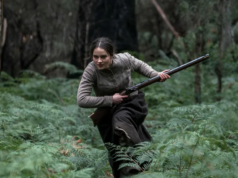A beautiful and honest coming-of-age drama that stands out because of its conviction, using a lot of fascinating symbolism to tackle familiar themes
Closet Monster (2015)
Written and directed by Stephen Dunn. Starring Connor Jessup, Aaron Abrams, Joanne Kelly, Aliocha Schneider, Sofia Banzhaf, Jack Fulton, Mary Walsh and Isabella Rossellini.
Coming-of-age LGBT movies tend to follow an easily recognizable formula: a sensitive teenager is at odds with his own sexuality, usually falls victim to bullying at school, fears his family’s (or friends’) homophobia, and falls in love with the charming boy who “sees him for who he is” and with whom he won’t be together in the end. All this makes us invariantly feel that these contrived stories are trying too hard to sound mature and sympathetic to the hardships that gay boys face when growing up. It’s the case for example of movies like Get Real (1998), Shelter (2007), Boys (2014), and many others. Having said that, it is always a pleasure to find a film that tries something new within this worn-out subgenre. Closet Monster may not be groundbreaking, but it pulses with incredible honesty and uses a lot of symbolism to tackle issues that others reach only superficially.
Written and directed by Stephen Dunn (in his feature debut) and inspired by his own experiences growing up as a gay teenager in St. John’s, Canada, Closet Monster tells the story of Oscar Madly (Connor Jessup), a creative teenager whose internalized homophobia is directly related to a traumatizing event in his life, when he witnessed a brutal gay hate crime as a kid. Since then, he repressed everything about his own sexuality and began to translate that into art, creating images and sculptures of monsters that represent feelings he doesn’t know how to deal with. But all this is about to change when he meets the cool (and attractive) new boy Wilder (Aliocha Schneider) and starts to face his own resentment towards his immature father and his mother, who left him when he was a child and now has another family.
Winner of the award for best Canadian feature film at the Toronto International Film Festival in 2015, Closet Monster may sound like your typical coming-out gay story, but it’s interesting to see what Dunn does with such familiar material, telling his version in an always sincere way. I remember seeing him once state in an interview that he feels the film exposes a lot of different aspects of his personality and interests, which is easy for us to understand, as it all feels very personal. What makes it special is how he approaches his themes. Oscar is shown as an imaginative boy who escapes into a fantasy world to cope with his issues, and while I’m not a big fan of those narrative devices that make characters seem schizophrenic, I admire what Dunn is trying to do and the effective way he illustrates the “closet monster” of his title.
And who doesn’t love a talking hamster? That’s right, Oscar has a hamster called Buffy (an obvious reference to Joss Whedon’s wonderful TV show) and voiced by no less than Isabella Rossellini. She is supposed to be his inner voice of conscience, and it is nice to participate in Oscar’s private conversations with himself — which includes Buffy complaining that she can clean her own cage by herself and indicating Oscar’s unconscious desire not to do it. Likewise, I love to see how Oscar feels a stomach pain when he meets the handsome Wilder, or whenever he is confronted by his confused sexuality (also symbolized by an iron bar that alludes to his memory of the crime). Thus, nothing seems more natural than seeing Oscar puking nails at some point when having sex with a man, or needing to go back to a tree house to “rescue” his childhood.
But if Dunn could have easily crafted something heavy-handed and pretentious by trying to be David Lynch, Closet Monster couldn’t be more down-to-earth in its approach, even finding space for some welcome moments of humor — like when Oscar’s boss at the supermarket gives him advice as to what to say to buyers, or when we see Oscar trying to work with a straight face after smoking weed with Wilder. Dunn also knows how to emphasize Oscar’s sensibility and intimacy by mostly employing a reduced depth of field, with a lot of close-ups and the use of rack focus. And it is interesting to see how the film keeps Oscar in the corner of the screen at a party, under a red light, as well as the contrast between the warm scenes when Oscar is nine years old and the cold, bluish palette when he is an 18-year-old teenager.
As Oscar, Connor Jessup may look too “normal,” but that’s the point; he is supposed to be the typical boy next door who feels alone, never got over his parents’ divorce and is always hostile to his mother. On the other hand, Aliocha Schneider is perfect as the easygoing blond guy who everyone would want to date, while Sofia Banzhaf, an actual real-life childhood friend of Dunn’s, plays Oscar’s best friend Gemma. And if Joanne Kelly gives life to a caring mother who is constantly trying to reach out to her son — even if we never really know why she never fought to have his custody in the first place — Aaron Abrams offers enough depth to Oscar’s impulsive and irresponsible father Peter, who insists on keeping half of his ex-wife’s clothes just to prove a point and even advises his son to cut his hair so he won’t be at risk of becoming gay.
With a great soundtrack and proving to be a breath of fresh air among coming-out dramas, Closet Monster stands out mainly because of its fascinating symbolism and conviction — like with a clever scene that shows Oscar’s transition from childhood to adolescence, when we see the 9‑year-old Oscar (Jack Fulton) cutting his hair and helping his father build the house tree (that is, embracing his “manliness”) before suddenly falling “into” his 18-year-old self. It’s these simple but elegant moments that make this film so worth it — a film that surprises us in the end by even making a mere popping sound become so meaningful.





